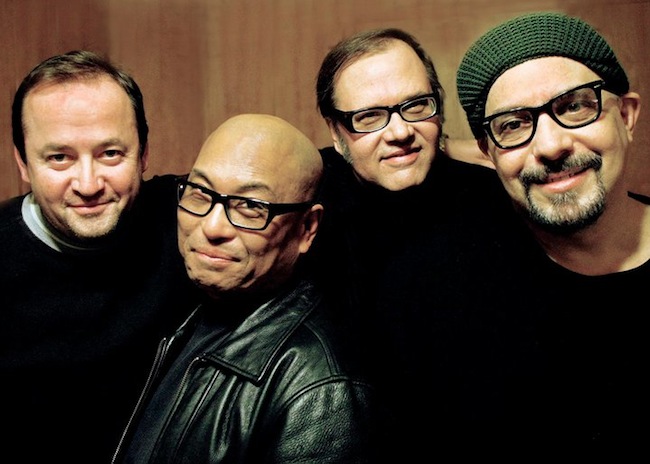Rock Interview: Pat DiNizio of the Smithereens, “practically an honorary Boston band”
“The kids in Boston accepted us unconditionally, and we hung out with everyone out there—Barrence Whitfield, the Bristols, the Del Fuegos.”

The Smithereens — performing their first show in Boston proper for more than two decades.
By Brett Milano
When inexhaustible Jersey rockers the Smithereens play Johnny D’s this Friday, it will be their first show in Boston proper for more than two decades. The last in-town club they played in 1994, Mama Kin on Lansdowne Street, doesn’t even exist anymore. It took till last year before they even got back to the suburbs, playing Salem and Natick around the holidays.
But there was a time when the Smithereens were practically an honorary Boston band, commuting here on a regular basis to play “Blood & Roses” and “Behind the Wall of Sleep” before they were hits (Disclaimer: They made friends at the time with quite a few locals, myself included). In the ‘80s and early ‘90s they played every Boston venue there was, from the Rat on up to the Garden (where they were part of a WBCN Christmas show). Frontman Pat DiNizio produced a Boston band (The Prime Movers, on their Matters of Time EP for the Throbbing Lobster label), and even wrote a hit song about a Boston musician. The band’s mix of ’60s roots, indelible tunes and big-guitar blast were a perfect fit for Boston at the time, and it’s a sound they’ve honed to this day.
On the eve of the show, I chatted with Pat DiNizio about the band’s local history.
Arts Fuse: First time I saw the Smithereens was at Jonathan Swift’s on Harvard Square, I believe in 1984. You had a gig backing up legendary songwriter Otis Blackwell.
Pat DiNizio: Yeah, and we recorded two albums with him which I recently found in my record collection. He was trying to mine the Elvis Presley obsession, writing songs like “The King’s Not Dead” which frankly I was slightly embarrassed to play. But we loved playing “All Shook Up,” “Don’t Be Cruel,” and “Handy Man.” What we learned from Otis was essentially how to be a professional band. We had done no real routing up to that point, had never been in the employ of any individual who had the depth of showbiz experience that Otis had. He penned all those great songs for Elvis, though Elvis shared credit. I remember one rehearsal where Dennis Diken [Smithereens drummer and rock historian] finally asked the question he’d been wanting to—that Elvis shares the credit on all the songs Otis wrote for him, but we all know Elvis never really wrote a song in his life. Dennis was kind of baiting him to see what happened and Otis said “It’s because 70 percent of something is better than 100 percent of nothing.” So we learned a lot about how the business operated.

Pat Dinizio of the Smithereens — “We have several credos in the Smithereens organization, and one is that we have to be better than bands half our age—We have to be twice as good.”
AF: You toured with the Ramones in the early days as well.
DiNizio: Yeah, they were total professionals with a lot of business sense, but we were competitive. Their road manager laid down all the rules—“You play 45 minutes, don’t touch their equipment, don’t talk to them, don’t go in their dressing room. You break the rules, you’re off the tour.” So we figured, okay, they want 45 minutes, we’ll give ‘em 30—just the songs they know from the radio. And it worked, we went over great. And I remember Joey Ramone talking to is afterwards—a tall guy, bending over us like a gigantic praying mantis. And he said, “You guys were good. Maybe a little too fuckin’ good, ya know what I mean?” But they let us use their lights and PA once they realized we were stand-up guys.
AF: What accounts for the affinity the Smithereens had with Boston?
DiNizio: It had a better rock & roll and garage scene than New York—We had garage bands but they weren’t friendly to us. The kids in Boston accepted us unconditionally, and we hung out with everyone out there—Barrence Whitfield, the Bristols, the Del Fuegos.
I’ll tell you one story about the effect Boston had on our career. We were staying with Joyce Linehan [now Chief of Policy for the City of Boston] who was briefly the Smithereens’ manager. But unbeknownst to us, she was only 16 and still in high school at the time—We didn’t know that until we stayed on her living room floor and her parents freaked out. Anyway, she tells us that we should send a tape to Enigma Records, because there was a guy there who might want to sign us. That night we go to a party and I’m talking to Eric Stumpo [from the Providence psychedelic band Plan 9] who was bragging on the fact that they’d just been offered a deal by Enigma. And I’m thinking “Jesus, there’s only so many record deals to go around, and Plan 9 stole our slot!” I was so pissed off that I went home and sent Enigma a cassette—“Blood & Roses,” “Behind the Wall of Sleep,” and a couple of others. And the next week, [Enigma A&R] Scott Vanderbilt calls to offer is a deal. I was already 31 and nobody’s idea of what a rock star should look like—We weren’t Bon Jovi or the Hooters. So it was an epic struggle to keep Enigma from seeing us live, but it all worked out.
AF: And of course you wrote “Behind the Wall of Sleep” about the Bristols’ bass player Kim Ernst.
DiNizio: My crush on her led me to write that on a very hung-over morning after a party in Boston. I was sitting on a People Express plane back to LaGuardia, and wrote the lyrics down on a cocktail napkin. But there was no way I could sing it to my answering machine, because cell phones hadn’t been invented. So I’m singing the thing to myself for the whole flight, like a mantra so I don’t forget it. Then I get stuck in traffic for two hours and I’m nearly losing my mind, because I knew I had a good song.
AF: I saw you last year in Natick, and the show was at least two and a half hours. Does that happen all the time?
DiNizio: We have several credos in the Smithereens organization, and one is that we have to be better than bands half our age—We have to be twice as good. How many times have you seen an artist you’ve loved all your life and they’ve just lost the passion? There’s a certain sadness about that. So we don’t mind playing if the audience doesn’t mind staying. We believe in giving people more than what they came for and when we can no longer do that, that’s another conversation for another day.
Brett Milano has been covering music in Boston for decades, and is the author of Vinyl Junkies: Adventures in Record Collecting (St. Martins, 2001) and The Sound of Our Town: A History of Boston Rock & Roll (Commonwealth Editions, 2007). He recently returned from New Orleans where he was editor of the music and culture magazine OffBeat.
